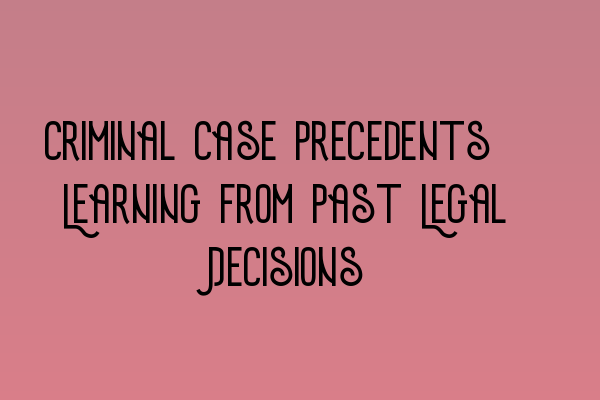Criminal Case Precedents: Learning from Past Legal Decisions
As a criminal law professional, understanding the importance of criminal case precedents is crucial in building a solid legal practice. Precedents serve as legal authorities that guide and shape future court decisions. They provide a valuable resource for both solicitors and barristers in navigating the complexities of criminal law.
Whether you’re preparing for the SQE 1 or SQE 2 exams or looking to enhance your legal knowledge, familiarizing yourself with criminal case precedents is essential. In this blog post, we will explore the significance of criminal case precedents, how they influence legal decisions, and why they should be an integral part of your legal strategy.
What are Criminal Case Precedents?
Criminal case precedents refer to previous court decisions that establish legal principles and guidelines. These decisions are made by higher courts, such as the Court of Appeal or the Supreme Court, and serve as a binding authority for lower courts. Precedents provide a framework for interpreting and applying the law in future cases, ensuring consistency and predictability in the legal system.
When a case is brought before a court, the judge will consider relevant precedents to determine the appropriate legal principles that should be applied. By examining past decisions, judges can make informed choices and ensure fairness and justice prevail.
How Do Criminal Case Precedents Influence Legal Decisions?
Criminal case precedents play a pivotal role in shaping legal decisions. They serve as a starting point for judges in interpreting and applying the law to specific facts and circumstances. Precedents provide a framework for understanding legal principles and guide the judge in determining the outcome of a case.
When a judge encounters a new case, they must evaluate the similarities and differences to existing precedents. If the facts and circumstances are similar, the judge is obliged to follow the established precedent, ensuring consistency and uniformity in the legal system. However, if the judge determines that the new case presents distinct features, they may decide to distinguish the case from existing precedents or even overrule them.
Thus, criminal case precedents create a continuous dialogue between past and future decisions, allowing the law to evolve and adapt to changing societal and legal needs.
Why Should You Learn from Criminal Case Precedents?
Learning from criminal case precedents is essential for a successful legal practice for several reasons.
1. Legal Authority
Precedents provide a legal authority that solicitors and barristers can rely on when defending their clients. By understanding and referring to relevant precedents, you can strengthen your arguments and ensure your client’s rights are protected. Additionally, using compelling precedents can help persuade judges and increase the chances of a favorable outcome.
2. Knowledge Expansion
Studying criminal case precedents exposes legal professionals to a wide range of scenarios and legal principles. By analyzing past decisions, you can gain insights into different criminal offenses, defenses, and sentencing considerations. This knowledge expansion enhances your overall legal acumen and allows you to approach cases from a more informed position.
3. Strategic Advantage
Familiarity with criminal case precedents gives you a strategic advantage in the courtroom. By understanding how past cases have been decided, you can anticipate the opposing party’s arguments and prepare counterarguments accordingly. This enhances your ability to craft a compelling legal strategy and increases the likelihood of achieving a successful outcome for your client.
How to Access Criminal Case Precedents
Accessing criminal case precedents has become significantly easier with the advent of digital platforms. Online databases like LexisNexis and Westlaw provide comprehensive access to a vast collection of case law from various jurisdictions. These platforms allow you to search for specific criminal cases, review court judgments, and identify relevant precedents for your legal research.
Additionally, staying updated with legal publications, journals, and law reports dedicated to criminal law can help you discover recent and significant precedents. These resources offer insightful analysis and commentary on groundbreaking cases, enabling you to stay ahead in your legal practice.
Conclusion
Criminal case precedents are invaluable tools in the arsenal of every criminal law professional. By learning from past legal decisions, we can shape our legal strategies, ensure fairness and justice, and advocate effectively for our clients. So, whether you are preparing for the SQE 1 or SQE 2 exams or striving to enhance your legal knowledge, make criminal case precedents an integral part of your legal education and practice.
For more resources on SQE exam preparation, practice exams, and relevant courses, please check out the following articles:
